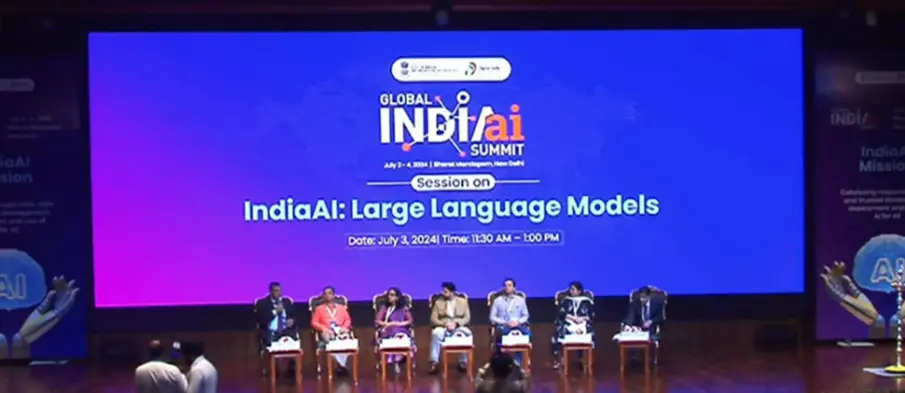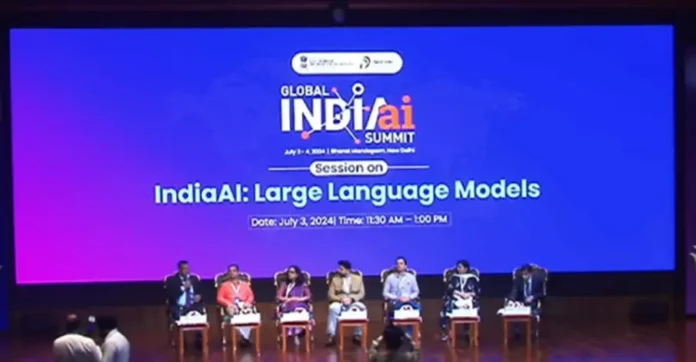
The world of Artificial Intelligence (AI) is evolving rapidly, and Large Language Models (LLMs) are at the forefront of this transformation. A panel of experts gathered at Global India AI Summit 2024 this week on 3-4 July, to discuss the future of LLMs, addressing key challenges, opportunities, and the strategic direction for AI development in India.
The Pillars of AI in India
Mr. Amitabh Nag, CEO Bhashini, was the moderator of the panel initiated the conversation by emphasizing on the need for India to create “AI in India and for India.” He outlined seven foundational pillars crucial for AI development, including the importance of democratizing data sets and promoting innovation through startup ecosystems.
India AI mission stands on 7 key pillar aiming to leverage India’s unique strengths and address its specific challenges – IndiaAI – Compute Capacity, Innovation Centre, Database Platform, Applications Development Initiative, Future Skills, Startup Financing and Safety & Trust.
The panel identified four primary objectives for advancing LLMs in India:
- Global Perspective: Understanding global trends, potential hallucinations, and fads in AI.
- Linguistic Challenges: Creating models that cater to India’s diverse linguistic landscape.
- Ethics and Bias: Addressing ethical considerations and cultural biases in AI models.
- Stakeholder Collaboration: Fostering collaboration among various stakeholders to build robust AI systems.
As India progresses on its AI mission, a cautious approach towards new technology is advised, emphasizing the need for sufficient computational resources and expertise. Initiatives like Bhashini contribute significantly to this progress, but handling intellectual property and licensing issues remains crucial. Dr. Pratyush Kumar, Co-founder of Sarvam AI, highlighted the growing value of computational resources in AI development, particularly in sectors like manufacturing and healthcare, underscoring this need.
AI has brought significant productivity improvements, with some applications achieving over 50% enhancement. Building safe AI from the ground up, integrating ethical considerations at every stage, is essential. Mr. Srinivas Narayanan, Vice President of OpenAI, described it as the most important evolution of our times, capable of answering complex questions and taking actions based on user queries.
Sourcing data and creating LLMs requires a focus on capturing success metrics through usability. Ms. Shalini Kapoor, Chief Technologist APJ at AWS, stressed the importance of setting data pipelines and mitigating biases. For instance, micro LLMs can forecast weather for farmers in agriculture, demonstrating the need to combine language and domain expertise for effective AI solutions.
Prof. Ganesh Ramakrishnan from IIT Bombay underscored the need for academia to collaborate closely with enterprises to make LLMs specific to India. Bharat GPT and similar initiatives highlight the importance of data and innovation in building algorithms. Documenting dialects to preserve linguistic diversity and developing explainable models for small languages are vital efforts in this regard.
Accurately representing India’s culture in LLMs is a key concern. Mitigating biases requires an insider’s view and the use of indigenous knowledge bases. Dr. Kalika proposed a clear framework to define, identify, and mitigate biases, highlighting the need for a federation of models to ground verbal knowledge in written form.
Building foundational models in a country with 10,000 dialects across 123 languages presents significant challenges. Mohit pointed out the limitations of existing models like ChatGPT, which rely on synthetic data and architectural decisions that may not suit small startups. Incorporating various voice modulations and meanings ensures that models meet enterprise needs effectively.
The panel discussion provided a comprehensive overview of the current state and future direction of LLMs in India. From addressing linguistic diversity and ethical considerations to fostering innovation and collaboration, the experts laid out a roadmap for building AI systems that are not only advanced but also aligned with India’s unique needs and cultural ethos. As India continues its journey towards becoming a global AI powerhouse, these insights will be crucial in shaping its AI strategy and development.





